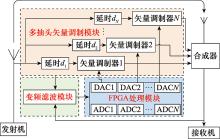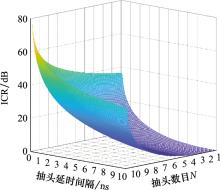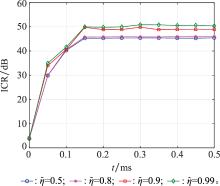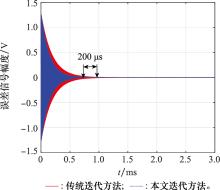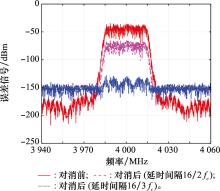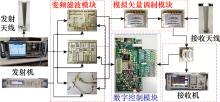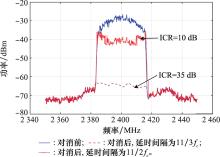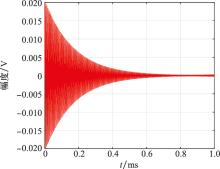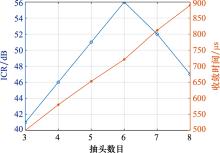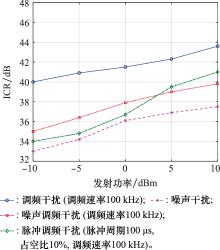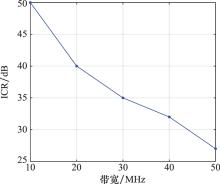| 1 |
KIAYANI A , WAHEED M Z , ANTTILA L , et al. Adaptive nonlinear RF cancellation for improved isolation in simultaneous transmit-receive systems[J]. IEEE Trans.on Microwave Theory Techniques, 2018, 66 (5): 2299- 2312.
doi: 10.1109/TMTT.2017.2786729
|
| 2 |
KOLODZIEJ K E , YEGNANARAYANAN S , PERRY B T . Photonic-enabled RF canceller for wideband inband full-duplex wireless systems[J]. IEEE Trans.on Microwave Theory and Techniques, 2019, 67 (5): 2076- 2086.
doi: 10.1109/TMTT.2019.2896564
|
| 3 |
HE F M, QIN H D, MENG J, et al. An adaptive cancellation method of wideband co-frequency noise[C]//Proc. of the Joint International Symposium on Electromagnetic Compatibility, Sapporo and Asia-Pacific International Symposium on Electromagnetic Compatibility, 2019: 548-551.
|
| 4 |
KING B , XIA J , BOUMAIZA S . Digitally assisted RF-analog self interference cancellation for wideband full-duplex radios[J]. IEEE Trans.on Circuits and Systems Ⅱ: Express Briefs, 2018, 65 (3): 336- 340.
doi: 10.1109/TCSII.2017.2736252
|
| 5 |
何方敏, 李毅, 孟进, 等. 基于导频的同频噪声干扰对消技术[J]. 系统工程与电子技术, 2020, 42 (5): 992- 998.
|
|
HE F M , LI Y , MENG J , et al. Pilot-aided cancellation technology for co-frequency noise interference[J]. Systems Engineering and Electronics, 2020, 42 (5): 992- 998.
|
| 6 |
SABHARWAL A , SCHNITER P , GUO D N , et al. In-band full-duplex wireless: challenges and opportunities[J]. IEEE Journal on Selected Areas in Communications, 2014, 32 (9): 1637- 1652.
doi: 10.1109/JSAC.2014.2330193
|
| 7 |
LI W L , ZHAO Z H , TANG J , et al. Performance analysis and optimal design of the adaptive interference cancellation system[J]. IEEE Trans.on Electromagnetic Compatibility, 2013, 55 (6): 1068- 1075.
doi: 10.1109/TEMC.2013.2265803
|
| 8 |
HWANG C , POMMERENKE D , FAN J , et al. Wideband noise measurement technique in duplex systems for RF interference[J]. IEEE Trans.on Electromagnetic Compatibility, 2018, 60 (3): 1038- 1044.
|
| 9 |
QIN H D , HE F M , MENG J , et al. Impact of wideband interference coupling path dispersion on performance of radio-frequency interference adaptive cancellation system[J]. IET Microwaves, Antennas & Propagation, 2020, 14 (12): 1337- 1346.
|
| 10 |
CHOI J I, JAIN M, SRINIVASAN K, et al. Achieving single channel, full duplex wireless communication[C]//Proc. of the International Conference on Mobile Computing & Networking, 2010.
|
| 11 |
WANG Q L , LI Y , LUO K , et al. Auxiliary antenna array analysis and design for sidelobe interference cancellation of sate-llite communication system[J]. Progress in Electromagnetics Research M, 2020, 96 (1): 55- 67.
|
| 12 |
BYOUNGHAK K , YU H , NOH S . Cognitive interference cancellation with digital channelizer for satellite communication[J]. Sensor, 2020, 20 (2): 355- 361.
doi: 10.3390/s20020355
|
| 13 |
JAIN M, CHOI J I, KIM T M, et al. Practical, real-time, full duplex wireless[C]//Proc. of the International Conference on Mobile Computing & Networking, 2011: 301-312.
|
| 14 |
XU D . Jamming-assisted legitimate surveillance of suspicious interference networks with successive interference cancellation[J]. IEEE Communications Letters, 2020, 24 (2): 396- 400.
doi: 10.1109/LCOMM.2019.2957217
|
| 15 |
KOLODZIEJ K E , COOKSON A U , PERRY B T . Adaptive learning rate tuning algorithm for RF self-interference cancellation[J]. IEEE Trans.on Microwave Theory and Techniques, 2021, 69 (3): 1740- 1751.
doi: 10.1109/TMTT.2020.3021100
|
| 16 |
GE S H , MENG J , XING J L , et al. A digital-domain controlled nonlinear RF interference cancellation scheme for co-site wideband radios[J]. IEEE Trans.on Electromagnetic Compatibility, 2018, 61 (5): 1647- 1654.
|
| 17 |
QUAN X , LIU Y , SHAO S H , et al. Impacts of phase noise on digital self-interference cancellation in full-duplex communications[J]. IEEE Trans.on Signal Processing, 2017, 65 (7): 1881- 1893.
doi: 10.1109/TSP.2017.2652384
|
| 18 |
LI C X , ZHAO H Z , WU F , et al. Digital self-interference cancellation with variable fractional delay FIR filter for full-duplex radios[J]. IEEE Communications Letters, 2018, 22 (5): 1082- 1085.
doi: 10.1109/LCOMM.2018.2810270
|
| 19 |
MCMICHAEL J G, KOLODZIEJ K E. Optimal tuning of analog self-interference cancellers for full-duplex wireless communication[C]//Proc. of the 50th Annual Allerton Conference, 2012: 246-251.
|
| 20 |
HUUSARI T, CHOI Y S, LⅡKKANEN P, et al. Wideband self-adaptive RF cancellation circuit for full-duplex radio: ope-rating principle and measurements[C]//Proc. of the IEEE 81st Vehicular Technology Conference, 2015.
|
| 21 |
CHOI Y S , HOOMAN S M . Simultaneous transmission and reception: algorithm, design and system level performance[J]. IEEE Trans.on Wireless Communications, 2013, 12 (12): 5992- 6016.
doi: 10.1109/TWC.2013.101713.121152
|
| 22 |
KOLODZIEJ K E , MCMICHAEL J G , PERRY B T . Multitap RF canceller for in-band full-duplex wireless communications[J]. IEEE Trans.on Wireless Communications, 2016, 15 (6): 4321- 4334.
doi: 10.1109/TWC.2016.2539169
|
| 23 |
LU H T , HUANG C , SHAO S H , et al. Novel multi-tap analog self-interference cancellation architecture with shared phase-shifter for full-duplex communications[J]. Science China (Information Sciences), 2017, 60 (10): 139- 154.
|
| 24 |
SPENCER Q H , JEFFS B D , JENSEN M A , et al. Modeling the statistical time and angle of arrival characteristics of an indoor multipath channel[J]. IEEE Journal on Selected Areas in Communications, 2000, 18 (3): 347- 360.
doi: 10.1109/49.840194
|
| 25 |
王俊, 赵宏志, 马万治, 等. 同时同频全双工宽带射频自干扰对消性能分析[J]. 通信学报, 2016, 37 (9): 121- 130.
|
|
WANG J , ZHAO H Z , MA W Z , et al. Performance analysis of broadband self-interference cancellation at RF domain in co-frequency co-time full duplex systems[J]. Journal on Communications, 2016, 37 (9): 121- 130.
|
| 26 |
ZHAO H Z, WANG J, TANG Y X. Performance analysis of RF self-interference cancellation in broadband full duplex systems[C]//Proc. of the IEEE International Conference on Communications Workshops, 2016: 175-179.
|
| 27 |
刘建成, 全厚德, 李召瑞, 等. 多路延时正交合成的多径信道射频干扰对消[J]. 电子与信息学报, 2017, 39 (3): 654- 661.
|
|
LIU J C , QUAN H D , LI Z R , et al. RF interference cancellation based on multi-tap delay and orthogonal combination in multipath channel[J]. Journal of Electronics & Information Technology, 2017, 39 (3): 654- 661.
|
| 28 |
吴飞, 马万治, 邵士海, 等. 多抽头延时设置与幅相误差对全双工射频自干扰消除的影响[J]. 电子与信息学报, 2015, 37 (7): 1538- 1543.
|
|
WU F , MA W Z , SHAO S H , et al. Impact of delay setting, amplitude and phase errors on multi-tap self-interference cancellation in full-duplex system[J]. Journal of Electronics & Information Technology, 2015, 37 (7): 1538- 1543.
|
| 29 |
QIN H D , MENG J , HE F M , et al. Design and analysis of digital-to-analog hybrid RF interference cancellation system based on multitap structure[J]. IEEE Trans.on Microwave Theory and Techniques, 2021, 69 (9): 4300- 4314.
doi: 10.1109/TMTT.2021.3086825
|
| 30 |
OPPENHEIM A V , WILLSKY A S , NAWAB S H . Signals and systems[M]. Upper Saddle River: Prentic Hall, 1996.
|
| 31 |
苟川杰. 基于多抽头结构的射频域宽带干扰对消技术研究[D]. 武汉: 海军工程大学, 2019.
|
|
GOU C J. Study on wideband interference cancellation techno-logy in radio frequency domain based on multi-tap structure[D]. Wuhan: Naval University of Engineering, 2019.
|
